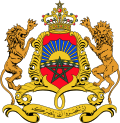History
Tehran cut off all diplomatic ties with Rabat in 1981. This was in response to King Hassan II's decision to give asylum to the exiled Shah Mohammad Reza Pahlavi. It was almost a decade before relations would thaw enough to renew ties. It was almost one decade after that before Abderrahmane Youssoufi, Prime Minister of Morocco at the time, would lead the first Moroccan delegation to the Islamic Republic of Iran. [1] Economic ties increased greatly in recent times. [2]
On 6 March 2009, following an Iranian official's statement that questioned the sovereignty of Sunni-ruled Bahrain, King Mohammed VI of Morocco decided to sever the country's diplomatic relations with Iran. The official's remark sparked a significant backlash from the Sunni Muslim community. Morocco also accused Iran of attempting to spread its Shi’ite version of Islam in the country, which it deemed as a danger to its moderate Sunni religious identity. [3]
In February 2014, the two countries announced they were re-establishing diplomatic ties. [4]
On 2 May 2018, Morocco cut its diplomatic ties with Iran for the third time, with the Moroccan Foreign Minister Nasser Bourita citing alleged Iranian financial and logistical support to the Polisario Front through its Lebanese proxy Hezbollah and the Iranian embassy in Algiers. [5] [6]
This page is based on this
Wikipedia article Text is available under the
CC BY-SA 4.0 license; additional terms may apply.
Images, videos and audio are available under their respective licenses.


